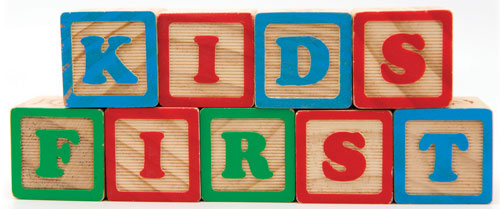By MARCIA G. HALE
“My mom can live in one half, and my dad can live in the other half, and me and my brother can live in between where they live.”
What does this statement mean to you and me, being that we are adults? Silliness? Unsophisticated chatter? Manipulation? Actually, this is the thought pattern of an 8-year-old going through divorce who expressed this in a therapy session.

This child was in therapy—where I strongly believe all children going through divorce should be for a period of time to allow the expressing of their fears, concerns, and possible relief about their parents divorcing. This particular child wanted a big house, one side for mom, one side for dad, and she and sibling would live in the middle. This thought makes me sad for the child. It hurts my heart, as I have seen children of all ages suffer when mom and dad divorce.
When parents divorce, the children divorce, too. What can we as adults do to help the children through the process? My number one rule when working with children is to get the parents to stop thinking of themselves and think of their children.
To begin the process of putting the children first during the divorce, the couple needs to come to terms that they do not like each other. In fact, they may hate each other. The couple must come to terms with the realization that their marriage is now part of the statistical data that shows nearly 50 percent of all marriages in America end in divorce. Obviously, at the point of filing for divorce, the couple has probably attempted all they know how to do to fix their relationship. You need to file the papers, go to counseling for your help through the process and life transition, take your child to counseling and participate in the counseling process with them (mom and dad), and go on with your life. You made a mistake, you changed, or one of you changed in the relationship. Move on and take care of your children!
It is my belief that children often take as long as two years to adjust to the divorce. For a child to adjust positively, effective parenting should take place. The parents are responsible for keeping the child out of the middle of the divorce. The divorce of the parents is “adult stuff.” The child does not need to know who is paying child support, how much, when, or why the parents are no longer going to be married—no matter the reason for the divorce. The child needs to know where they are going to sleep, what they will be eating, what they will be wearing, who will make sure they get to school and back home safely. The child’s life is upset enough without being concerned with the “adult stuff” of divorce.
Aside from having the child/children in counseling, here are suggestions for making the life transition manageable for the child involved:
- State your unconditional love to the child. “We (mom and dad) love you.” I also suggest that the child be frankly told, “You did not cause this divorce, we caused this divorce, and we will still love you as if we were living together.”
- The child should be helped to understand there will be rules at mom’s house and rules at dad’s house. Children can understand the difference of the rules at the different houses. This is not ideal, but as parents you probably did not agree on all rules while you were married. It is no different when you divorce. Your rules, or the desire for specific rules, may be different. Now you can enforce your rules and allow the ex-spouse to enforce their rules.
- Parents should come together as a united front for basic rules such as homework, bedtime, approved television shows to watch, music to listen to, and other activities. Some other examples are time allotted per day for the use of media, such as video games, talking on the phone, texting, and computer use.
- When you choose to date, introduce your child/children to a significant other only when they truly are a significant other. I would define this as a person you have dated for at least 6-9 months and with whom you have seriously considered marriage. During the process of dating, discuss stepparenting, blending families, discipline, and any other areas of life you feel are important. Children will become confused and may regress to early fantasies of parents’ reuniting when there is a revolving door of potential stepparents.
- Be consistent. Children love structure, consistency, and predictability. If you are consistent in your parenting while offering structure, the child can easily predict what their home life will be like. Your life as a parent will be more enjoyable if you offer this trifecta.
In hopes that this information gives you peace with the process of divorce, remember we have comfort knowing that children are a gift from God. The Old Testament reminds us that parents should give instruction (guidance) to their children, and not just give rules and expectations (Proverbs 1:8-9). The New Testament, Matthew 19, tells us that Jesus loves little children. No matter what changes you have in your adult life, take care of the most precious creation you will ever have the privilege of influencing—your offspring.
Marcia G. Hale is a Licensed Professional Counselor in private practice in Ridgeland. She is also a graduate instructor of Lifespan Development at Mississippi College. She can be reached at 601.398-5576.


